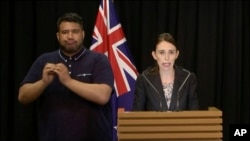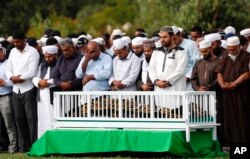New Zealand Prime Minister Jacinda Ardern on Thursday announced a ban of “military-style semi-automatic” weapons. The ban comes just six days after the mass shootings at two Islamic religious centers in the city of Christchurch. Fifty people died in the attacks.
Ardern said New Zealanders could turn in their guns while officials develop a buyback program. The program could cost the government as much as $140 million.
The ban includes all semi-automatic weapons and shotguns that can be used with removable magazines that hold more than five rounds of bullets.
Ardern said the man charged in the mosque attacks used 30-round magazines that he bought “easily through a simple online purchase.”
The prime minister added, “Every semi-automatic weapon used in the terrorist attack on Friday will be banned.”
The ban does not include smaller guns or shotguns with non-removable magazines, which are commonly used among farmers and hunters in New Zealand. There are nearly 250,000 licensed gun owners in New Zealand, a country of 5 million people.
Police and military members will not be affected by the ban. Access to such weapons for use during international shooting competitions would be considered.
After Ardern’s announcement, one of New Zealand’s largest gun sellers, Hunting & Fishing New Zealand, repeated its support of “any government measure to permanently ban such weapons.”
Its chief executive, Darren Jacobs, said in a statement, “Last week’s events have forced a reconsideration that has led us to believe such weapons of war have no place in our business — or our country.”
Even without the ban, Jacobs said the company would no longer sell any assault-style weapons of any kind. The company also plans to stop selling weapons online.
Polly Collins of Christchurch praised the quick action from the prime minister. She told the Associated Press, “It’s not like in America, where they have all these things and then they go ‘Oh yeah, we’ll deal with the gun laws,’ and nothing’s done.”
Last March, Americans turned out in large numbers to demand stronger gun control measures after the shooting in Parkland, Florida that left 17 people dead. The call for gun control was similar to others that happened after every mass shooting in the United States.
Gun-rights supporters in America note that gun ownership is protected under the Second Amendment of the U.S. Constitution.
Around the world, some countries have taken measures to limit the sale of guns after deadly incidents.
Australia
After 35 people were killed in a mass shooting in Australia’s Tasmania in 1996, the federal government passed a law banning all automatic and semiautomatic weapons.
The government also spent hundreds of millions of dollars to buy back more than 650,000 weapons. Some experts have credited the measures for reduced gun deaths and violence in that country.
Japan
Japan has some of the strictest gun laws and among the lowest homicide rates in the world. Japanese laws only permit shotguns and air rifles. Weapons are also permitted for research and use in competitions.
If someone in Japan wants to own a gun, they must attend a class and pass a written exam and shooting test. They also must pass a mental health examination and a background check. The gun owners must then repeat that process every three years.
Norway
The Small Arms Survey reports that Norway has a high rate of gun ownership but a low rate of homicide. Norwegian police do not carry weapons.
Gun control was not a major issue in Norway until the 2011 mass shooting at a summer camp that killed 77 people. After the shooting, an independent group proposed tighter gun laws. However, no changes were made.
Britain
In 1987, a gunman armed with semiautomatic weapons and a handgun shot and killed 16 people in a small town west of London. The incident led to Britain passing new laws that banned semiautomatic weapons and required shotgun owners to register their weapons.
An even stricter gun law was passed after the shooting death of 16 schoolchildren and one adult in 1996. The shooting in Dunblane led to the ban of handguns and a $200-million gun buyback program.
I'm Jonathan Evans.
Hai Do adapted this story for Learning English based on information from the Associated Press, the World Economic Forum and the Council on Foreign relations. Ashley Thompson was the editor.
Write to us in the Comments Section or on our Facebook page.
_______________________________________________________________
Words in This Story
magazine - n. a part of a gun that holds bullets
mosque - n. a building that is used for Muslim religious services
licensed - adj. having official permission or license
access - n. permission or the right to use something
homicide - n. the act of killing another person
background - n. information, experiences, .. in a person's past







